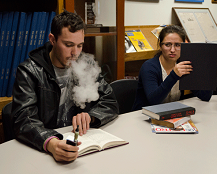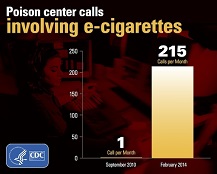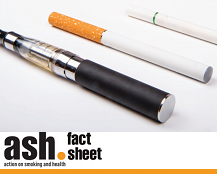A new systematic review from Dr. Konstantinos Farsalinos and Prof. Riccardo Polosa looks at 97 pieces of research on e-cigarettes and their ingredients, providing a comprehensive summary of the body of knowledge to date on e-cigs.
Passive vapor may be no more harmful (and probably way better smelling) than smoke and vapor-free human breath and even outdoor air.
The increasing prevalence of e-cigarette use seems to be stalling, as shown by a downward turn in their use among recent ex-smokers (after a continual rise since the start of 2012) and stagnation in usage rates among current smokers and use in respondents’ most recent quit attempts.
A new study from Dr. Konstantinos Farsalinos compares nicotine delivery from first generation e-cigs and newer electronic cigarette devices.
Are teens who try e-cigarettes more likely to try tobacco cigarettes? Stanton Glantz believes e-cig use may promote smoking.
A paper from Dr. Konstantinos Farsalinos and Prof. Gerry Stimson tackles the question of whether medical regulation for electronic cigarettes is justified.
A new UCSF study headed by Stanton Glantz has concluded that e-cigs don't aid in smoking cessation. So how did they come to this conclusion?
Study Investigates the Effect of Vaping on Indoor Air Quality – “E-Cigarettes Are Not Emission-Free”
Overall, this study provides further evidence that any bans on vaping in public places are not based on science, but fear and irrationality.
The CDC is reporting that the number of calls to poison control centers relating to e-cigarettes increased from one per month in September 2010 to 215 per month in February 2014.
A new survey examines the differences between dedicated vapers (who don't smoke) and dual users (who switch between e-cigs and cigarettes).
A new survey by ASH UK adds further evidence that electronic cigarettes are Not a gateway to cigarette smoking and they don't appeal to non-smokers.
A new systematic review on e-cigarettes, suggests that e-cigs should be banned in all public places and subject to tobacco-like marketing restrictions.
New study suggests that smokers who choose to quit by vaping are successful more often than self-selected cold turkey or NRT users, when no further support is provided.
A new study from Professor Riccardo Polosa and colleagues investigates the improvements seen in asthma-suffering smokers who either notably reduce or entirely quit smoking due to vaping.
The authors of a new paper into the carbonyl output of e-cigarettes (things like formaldehyde and acetaldehyde) and how the PG/VG ratio and voltage used influence it decided that the best way to disseminate their findings was through the New York Times.
A new study looking at data from over 26,500 European respondents has provided further evidence that non-smokers don’t try vaping very often at all.
A new study reports that “E-cigarette secondhand smoke has increased levels of toxic metals.” Are vapers exposed to smaller quantities of harmful components than smokers?
A recent study from Dr. Konstantinos Farsalinos and colleagues suggests that unlike cigarette smoking, vaping doesn’t have any adverse effects on acute heart function.
A new study by the New England Journal of Medicine claims that e-cigarettes lead to cocaine abuse. Find out why this is pure junk science.
A new piece of research has been released suggesting that the primary benefit of e-cigarettes, that they help people quit smoking, isn’t true when it comes to cancer patients.




















